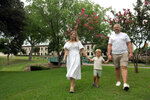
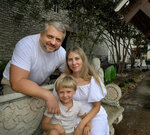
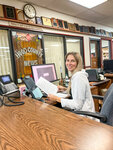
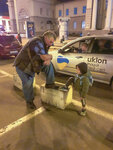
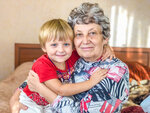
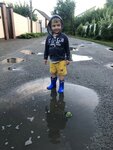
It’s hard to imagine what it would be like to have your life turned upside down by war. Even the most empathetic among us struggle to imagine what being displaced would feel like. So much of our identities come from where we call home.
Oksana Tyshchenko had never considered moving from her home country of Ukraine before the word “war” became more than an ugly word but a devastating reality in her life. As Ukraine became the discussion of people around the world, the Tyshchenko family had to consider some heavy choices.
“I never wanted to live in another country and never thought about moving, so leaving my home was very difficult. But on reflection, it was still easier than realizing and accepting that there was a war in your country and that things will never be the same as before. Because the war has changed everyone, including me,” Tyshchenko said.
Tyshchenko remembers the moment she decided her family would leave Ukraine.
“It seems to me that it will forever remain in my memory. While we were in Ukraine, even though we lived quite far from the combat zone, there were periodic massive missile attacks. And one such attack occurred 400 meters from us.
“We were walking at a playground, we had to run, we managed to hide just as windows began to blow out of buildings and shrapnel started flying ... my son was 3 years old.
“I thought it hadn’t affected him until we went to my parents' house and during a walk, an air raid siren went off nearby, ringing very loudly. Suddenly, my child started to run chaotically in the street, screaming and crying that we needed to hide because rockets were coming and they were going to kill us.
“I remember thinking to myself, 'I don’t know where, but we are leaving.’”
Tyshchenko and her husband, Max Grabov, decided to seek refuge in the United States, bringing their young son Yegor, now 5, with them. The choice meant leaving people and places that were precious to them, though technology has helped to ease the separation.
“I talk to my mom every day, and less often with my dad,” Tyshchenko said, explaining that her dad is more quiet but that her mom, Svitlana, shares their daughter's news with her dad, Oleg.
Keeping the bond close between Yegor and his grandparents was important to Tyshchenko.
“My mom wakes up every day at 5 a.m. to read fairy tales to Yegor. We have an eight-hour time difference, so when it's evening for us, it's early morning for them. If he gets tired of listening to fairy tales, they have heartfelt conversations.
“Time passes, he's growing up, and I believe that the involvement of grandparents in a child's life plays a significant role."
Part of new life in the United States for the Tyshchenko family and others like them is finding employment. In her home country, Tyshchenko held a degree in international economics, and worked as a teacher at a university.
Once in the United States Tyshchenko pursued temporary work with Workforce Solutions for North Central Texas, where she was placed in a position at the Hood County News. Max is pursuing an education through the Workforce program.
According to its website, the mission of Workforce Solutions is to advance business-driven solutions that promote economic growth, opportunity and a skilled workforce.
As a participant in the Workforce program, Tyshchenko has worked for the past six months in the front office of the local newspaper where she assists with classified ads, circulation and other office concerns. Pretty impressive, considering she is still working to master the English language.
English is known to be one of the hardest languages to learn. Fortunately Tyshchenko knew some English prior to coming to the U.S. and admits it has been one of the main struggles.
“Learning English as a process is not hard, but it's difficult to remember everything, and most importantly, to use it in my speech. The other thing, I find very confusing that the same word can have multiple meanings depending on context.
“When I was coming to America, I thought I knew English at a basic level. I studied it in school, and then at university. But when I arrived here, I realized that I absolutely couldn't understand what people were saying. In school, you learn academic language, which isn't really suitable for everyday communication. It was my personal disaster.
“Now I can hear people, understand what they are saying, but not always. My English learning continues, I learn new words every day, read, listen ... and try to speak. It's a matter of time ... "
Tyshchenko keeps notes cards of any new word she may learn or when she hears a word used in an unfamiliar context.
Yegor attended preschool during the last school year in Granbury Schools. The language barrier was a more significant struggle than Tyshchenko was prepared for.
“We thought he would pick up the language quickly and that it would be easiest for him, but it turned out not to be the case. It also took him time.
“He's very emotional and sociable, and of course, he ran to the children and wanted to play with them. But when he realized that he didn't understand them, he would burst into tears and didn't want to learn words.
“When I saw this, I was slowly dying inside. After all, I left everything behind and moved so that he could have a happy childhood, but it turned out that he was experiencing difficulties and was very upset about it.
“For the first six months at school, he told me every day that he didn't want to go to school because ‘he was dumb’ — he didn't understand the children and what they were saying. As a mother, it was incredibly painful to hear. But he had a wonderful teacher, Mrs. Kelly, who gave him the most important things — love and support.“
After the New Year's holidays, the situation changed.
“ … by the end of the year, he received a tablet for his reading achievements and we received a letter saying 'His car has finished the race.' I don't know what it means but nothing bad I hope. I couldn't help but be happy about this. He's not afraid to speak, he's understood. And people don't demand perfect English from him because he's a child."
Every visitor to the Hood County News is greeted with the warm smiles and greetings of the front office staff, including Tyshchenko. One would never guess that Tishchenko’s day started differently than most.
“My morning starts with reading news in Ukraine. When the war in Ukraine started, many channels were created for all cities so that news could be tracked in real time. Therefore, I even know when they (her family) are under missile attack.”
Tyshchenko lost a classmate and a friend to the war.
"If we are talking about my closest ones, then no. Thank God, he protects me and my family. But speaking of friends, one of my classmates died at the hottest spot near Bakhmut. Another friend with whom I grew up also died there. These are people I knew personally. And I want to say that you perceive the loss of someone you knew personally in a completely different way than the loss of someone you've only heard about."
Tyshchenko’s only sibling, a brother, Evgenii (Eugene) was required to serve in the Army when war broke out because of his police experience. All police were previously trained to serve in case their service was needed. Tyshchenko expressed the anguish families feel when their loved ones are called to service. Evgenii is married and the father of daughter Zlala, age 7.
A cousin of Tyshchenko’s and a lifelong friend, Svitlana, is counted among the many people that Tyshchenko misses. Svitlana is a cardiologist, now 29 years old; she entered the medical field at the age of 15.
At one time Svitlana would have been allowed to leave Ukraine, but many that could leave at one time are not allowed to immigrate now. Svitlana stayed in Ukraine to best serve her country; additionally, starting over with her education would be too laborious.
Tyshchenko’s husband Max left his brother, Artem, and their father, Anatoliy, in Ukraine. Max’s youngest brother Nikita moved to Canada with his wife Alevtyna and their daughter Nicole.
The Tyshchenko family came here with the Uniting for Ukraine (UFU) program. Their sponsors, David and Jennifer Orcutt and family, are Granbury residents, thus Granbury became the destination for the Tyshchenko family.
“Four months before our arrival here, our friends had come, and we lived with them initially. They told us what needed to be done, as they had already been through this process before.
We needed to understand how everything works: healthcare, insurance, taxes. Because in Ukraine, everything is absolutely different. Probably, these are the (would be considered) difficulties. To be honest, I still don't fully understand how everything works.”
Donations from local churchgoers helped the Tyshchenko family feel welcome.
“I know that people (Lakeside Baptist Church) brought things — bedding, beds and everything for the home — which really helped the Ukrainians who came here. There is huge support felt everywhere."
Tyshchenko was most surprised by the scale of the United States,
"I was impressed by the scale ... the scale of everything. The distances are very large, it's a very big country. Texas alone is the size of all of Ukraine, even though Ukraine is the largest country in Europe.”
She also notes surprise at the distance between things, the lack of sidewalks and the fact that Americans don’t travel by foot very much the way they do in Europe.
Tyshchenko has been well liked at the Hood County News. Coworker Nancy Pricer in the classified ads department has enjoyed working with Tyshchenko and the bond they have shard.
“I’ve been fortunate enough to spend a lot of one-on-one time with Oksana. We talk about a wide range of subjects, from kids to world politics. She is smart, funny, kind and very inquisitive. She loves learning and inspired me to learn more about the history of Ukraine, Russia and surrounding countries. Oksana is about my son’s age, and I call her my ‘international work daughter.’ “
Pricer recalls wanting to make Borscht, a beet soup that is popular in Tyshchenko’s part of Europe,
“I told her I was going to make it one day and she had her husband drive all the way to the office to deliver bay leaves and whole all spice, since I didn’t have them. She is very special to me. I know we will stay connected for years to come — God willing!”
For her part, Tyshchenko is glad her family landed in Granbury and has enjoyed her time at the HCN. This time is coming to a close this month as she approaches the end of the work part of her program.
"I don't just like working in the news; I am infinitely in love with this place, or rather, with the people I have the good fortune to work with. Initially, of course, I needed to get used to the staff, and they to me, but now, after quite some time, I simply adore the team I work with. And I am endlessly grateful and thankful to Sam Houston, that allowed me to become part of this team."
The Uniting for Ukraine program that the Tyshchenko family takes part in initially granted two years in the United States, that was then extended by two years. Tyshchenko does not anticipate that they will return to Ukraine, at least not permanently.
"I am very glad that my family and I ended up in Granbury. I could not have imagined more warm-hearted, open people who are ready to help in any situation. I can say that the people in Granbury are simply amazing, they have won my heart. I'm not joking.”
For information on Uniting for Ukraine see uscis.gov/ukraine. For information on Workforce Solutions for North Central Texas go to (dfwjobs.com).